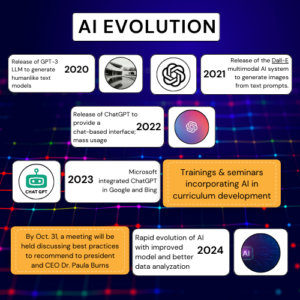
Instructors and students adjust to the inevitability of AI
The introduction of AI has led to a shakeup in typical student/teacher dynamics
By MARIANNE MIRAMBEL
Langara students say they are using AI to assist them in their schoolwork while avoiding academically dishonest uses of the new technology.
Amneesh Pal Singh, a third semester web and mobile app design and development student, said that he has used AI, but hadn’t implemented it until his second semester when he developed a project called WadroWiz.
“You can just upload the pictures of your clothes into your application and we suggest you the outfits automatically based on the AI,” Singh said.
He said his instructors have not banned the use of AI, but his instructors tell him and his classmates they can use it whenever they find themselves “stuck in our code.”
AI’s history in education
AI became widespread in early 2023 with the introduction of ChatGPT. Its effects have greatly disrupted the traditional relationship between teacher and student.
Alexandra Samur, a curriculum assistant at Langara’s teaching curriculum and development centre, said that AI took everybody by surprise and “all of a sudden, everybody was like ‘ChatGPT, ChatGPT.’”
“So everybody in our department and at the college was sort of starting to think about these tools, this technology and how we were going to adapt,” Samur said.
AI’s abilities in education
Patricia Tating, a Langara data analytics student, said she’s used ChatGPT since it came out and now “heavily” depends on it. “It just gives me … an idea or some instructions on how to build the codes,” Tating said.
She said that although instructors don’t specifically ban the use of AI tools, they also don’t promote the use of AI in assignments.
Singh said instructors should clarify to students how much they can integrate AI in their work, since there’s no specific rules given by instructors or the college.
Tating said that it’s not “necessarily cheating” if people use it as a support or a “virtual assistant” instead of copying and pasting.
ChatGPT’s faulty information
“ChatGPT is still prone to errors,” Tating said.
Singh said that there’s a difference between using AI for cheating, as opposed to using it as a tool for creating ideas.
He said that although it helps him to be more efficient, ChatGPT doesn’t always give accurate information. “We still need to have that knowledge to be able to debug the codes.”
Singh said that AI is getting better at anticipating a user’s next move by using neural networks. “The accuracy of AI is definitely growing,” he said.
AI is not going anywhere
Luke McKnight, an assistive technologist with the educational technology department, helps Langara’s instructional staff in using different types of technology like Brightspace and Zoom.
McKnight said that he considers AI a “revolutionary technology,” even though it’s still in its early stages. “The possibilities seem really limitless, and there’s a lot of concerns and I think they’re totally valid,” he said.
“But on the flip side … you can’t just stick your head in the sand and pretend it’s not happening.”
Listen to the audio companion of this story
Langara students and instructors speak about how AI is impacting their learning and teaching


Comments are closed.